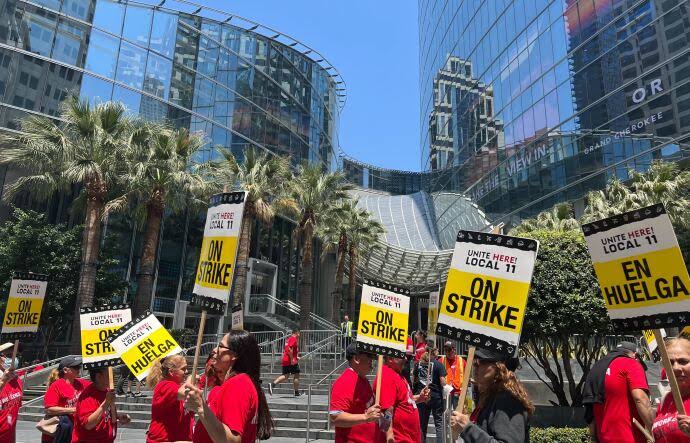On July 2, 2023, Los Angeles became the epicenter of one of the most significant workers’ strikes the US has seen in recent memory. More than 15,000 hotel workers staged a walkout, protesting the stark contrast between soaring housing costs and their modest earnings, which make living near their places of employment increasingly unfeasible.
At present, hotel employees in LA earn hourly wages ranging from $20 to $25. The COVID-19 pandemic had previously sidelined these workers, with the hospitality industry stagnating while other sectors surged ahead. The union representing these workers states that in addition to recovering from pandemic-induced hardships, employees now grapple with housing expenses that their stagnant wages cannot cover.
On that pivotal Sunday, over 1,000 workers set aside their tasks and marched through the streets. Hotels impacted by the strike include notable names like Intercontinental, Hotel Indigo, Millennium Baltimore, JW Marriott, Fairmont Miramar in Santa Monica, Sheraton Universal in Universal City, and Laguna Cliffs Marriott in Dana Point.
The industry bargaining group, representing over 44 LA hotels, has declared that these establishments will remain operational. Management and non-union employees will step in to fill the roles of those striking.
What the Workers Demand
The union reports that hotel workers earn between $20 and $25 per hour. Over the last five years, rising housing costs have pushed over 53% of these workers to relocate or face the prospect of having to move soon.
In response to these challenges, workers, backed by the union, are demanding a $5 increase in their hourly wages, with an additional $3 hike expected in subsequent years. Furthermore, they are advocating for enhanced healthcare benefits.
Moreover, the union is pushing for the establishment of a hospitality workers housing fund. This fund would be bolstered by a 7% tax levied on hotel guests.
The Industry Bargaining Group’s Counteroffer
The Industry Bargaining Group, representing over 44 hotels, has put forth a counterproposal. They suggest an initial $2.5 increase in hourly wages for the first 12 years. Following this, wages would rise by $6.5 over a four-year span for the majority of their workers.
Under this framework, employees in Beverly Hills and LA could expect a wage increase of 10%, pushing their earnings to more than $31 by 2027.
A History of Strikes: Los Angeles Takes a Stand
The Los Angeles region is no stranger to workers’ strikes. In March 2023, the Writers Guild of America initiated a strike, currently ongoing for over 100 days, with no resolution in sight. The core of their grievance?They demand compensation from distribution companies for shows streamed online. This contention isn’t new; it has simmered for over 15 years. Only recently has it boiled over, prompting actors to join the fray.
In the same month, over 30,000 education workers, backed by the teachers union in the Los Angeles area, halted their services. This move disrupted the education of more than 420,000 students. The union’s demands focused on an increase in “poverty wages,” targeting an average of $25,000 for their members. This group includes bus drivers, custodians, cafeteria staff, and classroom assistants.
Fast-forward to June 14, 2023: a significant agreement was reached between the Longshore union and the employers of over 22,000 dockworkers. This accord marked the renewal of a six-year contract, wrapping up 13 months of intense negotiations and promising stability for supply chain workers.
Conclusion
In conclusion, the recent hotel workers’ strike in Los Angeles reflects a growing trend of workers demanding fair wages and better living conditions in the face of rising costs. It underscores the importance of labor rights and the need for ongoing community engagement in addressing these pressing issues. “Stay informed and engaged in the issues that matter to you. Whether it’s labor rights, affordable housing, or other social issues, your involvement and support can make a difference in shaping a more just society,” says workers’ compensation lawyer Sheryl Lam of Silberman & Lam, LLP.

